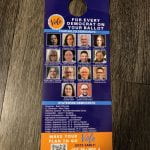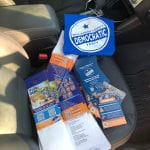Written by Zora Hermans
More often than not, it ends with a door being closed in my face. I try anyway. “Hi, my name is Zora and I’m with the Williamson County Democratic Party. Do you have a moment to talk about the upcoming election?” When the people are receptive, I am always in for a fascinating conversation. I’m learning so much about complete strangers, who I will likely never interact with again. What interests them about politics? What issues are important to them? How do they feel about the electoral process? All of these are topics that naturally arise from our discussion.
For the past month and a half, I have worked as a Field Organizer for the Williamson County Democratic Party (WCDP). What that means is I go to different neighborhoods (“turfs”) in the Round Rock/Hutto/Taylor area, knock on doors, and talk to people about the upcoming election. The WCDP is operating a “Coordinated Campaign,” which basically means that all of the Democratic candidates are running together. Our hope is that if someone votes for one Democrat, they’ll also vote for all the other Democrats on the ballot as well.
I work three times a week, for four hours each shift. An average shift looks like this: I have to leave my apartment about 45 minutes before my shift starts (the curse of working in a different county). I usually leave at about 2:15 and drive up I-35 to Round Rock. The WCDP has an office front in Georgetown that consists of a front room filled with Democratic merch and a receptionist desk and two conference rooms. I meet my boss Valerie and the other Field Organizers in one of the conference rooms, where we discuss our turf assignments and our experiences on the job. Sometimes these meetings go on longer, if we’ve had especially eventful shifts or if we are transitioning to a new phase, but usually they’re no more than 15-20 minutes. This is also the chance for me to pick up more literature that I will be passing out throughout my assigned turf.
After that, I drive to my assigned neighborhood. We are assigned our neighborhoods using the app Van. This app (pictured here) shows us the different houses I have to hit and their desired occupants. I am also told the person’s voting histories and if they’ve responded to any of our surveys in the past.
Once there, I lather on my sunscreen (I find that very few of these neighborhoods have adequate tree coverage), gather my literature, and head out. Using the Van app, I go from house to house. At each door, I knock and wait at least a minute. If no one answers the door, I leave the pamphlet on the door handle and move onto the next. If someone does open the door, I introduce myself and my “mission” and ask if the name on Van is there. Once that person has come to the door, I reintroduce myself and ask if they can answer a few questions about their interest in the upcoming election. I then cross my fingers that they say yes.
The first question I ask is if they are registered to vote and if they are planning to do so in this election. If yes, I move on. If no, I ask why they aren’t interested in voting. There’s no formula for their responses, I base my answers entirely off of them. I’ve had a few people say something like “oh, I just don’t think I have time,” to which I try and reiterate how easy it is to vote. The pamphlets we hand out have all the necessary information and I explain that there are many different ways and opportunities to do so. Sometimes they say “I just don’t think it matters.” In those instances, I ask them what political issues matter to them and try to link them to current events. Each time is different and I never know what to expect when I knock on a new door. If they are planning on voting, I ask them if they know (and are willing to share) which way they plan to vote. I ask about the Governor race, then about how they vote in local elections. Most of the time I’m met with “I vote with the person, not the party”, which is perfectly understandable, but I then have to ask “and are those people usually Democratic or Republican?” Again, each answer and each person is different. At the most fundamental level, I am asking each person if and how they’re voting, and why.
I find my experience at my internship fascinating. I am meeting so many different people, interacting with so many different political viewpoints, and learning so many different things about Texan voters. Luckily, I haven’t had any adverse experiences just yet (I do have a co-worker who was screamed at by an angry Republican demanding she leave his property before he got his gun), and everyone I have talked to have been civil enough. The most interesting, yet difficult, aspect of this job has been adapting the way I talk about politics. Throughout my Political Science classes and academic career, I’ve come to view American politics as a scientific, rigid process. The people I’m meeting on the job, however, see it far differently. For example, I can’t imagine not voting or not caring about a governor’s race, but for many people, it’s not a guarantee or even something they were considering.
It’s also been riveting to watch how the race has progressed through the eyes of the WCDP. When I was interviewing high-propensity Democrats, I was of course encouraged by Beto’s chances. I was thinking “wow this is great, he totally has a good chance of winning.” Now, unfortunately, I’m not so sure. Surveying the low-propensity Democrats (many of whom have turned out to be strong Republicans), I’m now worried about Beto’s chances. I’m therefore excited for next week, when we go back to talking to strong Democrats.
Overall, my internship experience has been a period of highs and lows. I’ve been glared at and ignored, but I’ve also had some amazing and eye-opening conversations with a diverse range of people (I even met a member of one of my favorite bands, the Black Pumas). Although my time with the WCDP will end on November 8th, with whatever the results of the election are, I know that I’ll take the skills I’ve gained and the lessons I’ve learned with me throughout my future career, which I hope will involve more political campaigns.

We give out our “ballot.” Voters can take this into the voting booth with them to see who we’ve endorsed.

The passenger seat of my car has become a bit of a mess as I travel to different precincts.

Some of the pamphlets I pass out while canvassing.